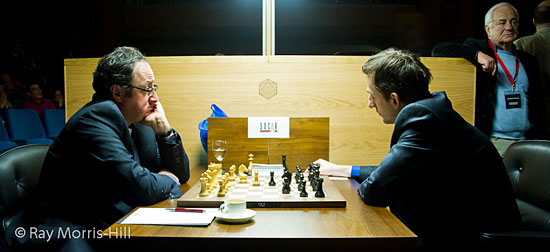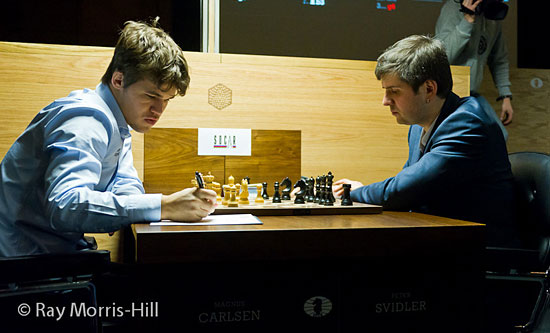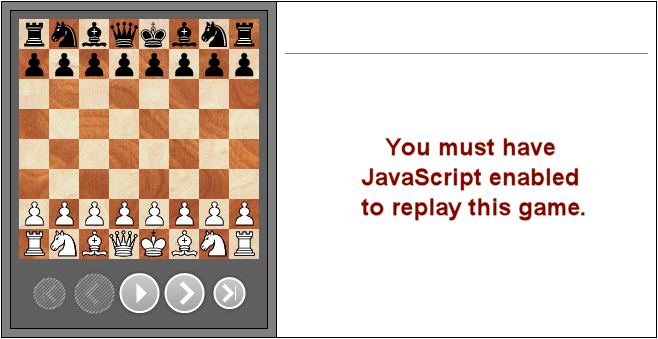


 f
f
From March 14 to April 1, 2013, FIDE and AGON – the World Chess Federation’s commercial partner – are staging the 2013 Candidates Tournament for the World Chess Championship 2013. It will be the strongest tournament of its kind in history. The venue is The IET, 2 Savoy Place, London. The Prize Fund to be shared by the players totals €510,000. The winner of the Candidates will become the Challenger to Viswanathan Anand who has reigned as World Champion since 2007. The main sponsor for the Candidates is State Oil Company of the Azerbaijan Republic SOCAR, which has sponsored elite events chess in the past.
The most spectacular tournament of recent years has come to an end. The drama of the last few rounds has been unprecedented in recent memory. The excitement brought spectators flocking to every chess site, even to the point of overloading some of them! The fans were eager to know who would challenge Anand, and here is how it all unfolded.
| Round 14 April 1 at 14:00 | ||
|
Magnus Carlsen
|
0-1
|
Peter Svidler |
|
Vassily Ivanchuk
|
1-0
|
Vladimir Kramnik |
|
Boris Gelfand
|
½-½
|
Alexander Grischuk |
|
Levon Aronian
|
1-0
|
Teimour Radjabov |
|
Playchess commentary: GM Maurice Ashley
|
||

Grischuk’s Gruenfeld was more than sufficient to neutralize any attempts for a lastround victory by the Israeli, and the game ended in a draw after White’s king was too exposed and had to allow a perpetual.

Aronian, who after the first half seemed to be the only one with chances to stop Carlsen from playing Anand, suffered some serious setbacks in the second half and tried to have a strong finish. Radjabov, who probably wants to forget this tournament as soon as possible and losing over thirty (!?) rating points in the process, was looking to at least not lose the last round. Unfortunately the Armenian’s will was stronger and a complicated game led to an interesting endgame in which White had two rooks for Black’s queen. Although theoretically equal, the endgame was more pleasant to play with White, and after Radjabov made just one slip Aronian’s brutal attack on the king was enough to win the game.

Everyone knew the tournament situation. Carlsen would look for a win, and try to clinch first place regardless of Kramnik’s result. A typical Spanish gave White a very minimal edge, and both sides tried to attack the enemy king using their knights and long range bishops. On move 31, disaster strikes. Svidler’s simple mate threat on g2 can be parried in two ways: one is a simple tactic that uses Black’s king on f8 to not only trade off the dangerous light squared bishop, but it also won a pawn. The other simply gave Black a strong attack. Carlsen, maybe exhausted from his efforts, chose the latter and almost paid dearly. The advantage was too strong; the pair of bishops and extra pawn were too much even for the Norwegian magician. Svidler defeated Carlsen.

[Event "FIDE Candidates 2013"] [Site "London"] [Date "2013.04.01"] [Round "14"] [White "Carlsen, Magnus"] [Black "Svidler, Peter"] [Result "*"] [ECO "C77"] [WhiteElo "2872"] [BlackElo "2747"] [Annotator "Ramirez,Alejandro"] [PlyCount "96"] [EventDate "2013.??.??"] [EventCountry "ENG"] 1. e4 e5 2. Nf3 Nc6 3. Bb5 a6 4. Ba4 Nf6 5. O-O Be7 6. d3 {The increasingly popular quick d3 system, yet again seen in London. Carlsen crushed Svidler with the black side of this system, surely he can also outplay him with white.} b5 7. Bb3 d6 8. a3 O-O 9. Nc3 Bb7 10. Bd2 Qd7 11. a4 Nd8 $5 {Very solid play, though there were viable alternatives for sure. The idea of moving the knight from c6 is nothing new in the Spanish. It is now being rerouted to f4.} 12. axb5 axb5 13. Rxa8 Bxa8 14. Ne2 Ne6 15. Ng3 c5 16. Nf5 Bd8 17. c4 bxc4 18. Bxc4 {White has a maybe microscopically more pleasant position. His bishop on c4 is well placed, the knight on f4 is relatively uncomfortable, but Black still has many resources.} Bc7 19. Re1 Re8 20. Qc1 Nh5 (20... Nd4 {already blunders the game.} 21. N3xd4 cxd4 22. Nxg7 $18) 21. g3 (21. b4 $1 cxb4 22. Bxb4 {Would've given him a pleasant edge, but the symmetrical position gives Black good chances for a draw.}) 21... g6 22. Nh6+ Kg7 23. Ng5 Nxg5 24. Bxg5 d5 25. exd5 Bxd5 26. Ng4 Bf3 {Svidler thought this idea was very strong, and that Carlsen underestimated it. However, it is possible both missed White's resource on move 31.} 27. Bf6+ Kg8 28. Nh6+ Kf8 29. Qe3 (29. Nxf7 Nxf6 30. Qh6+ Ke7 $2 { Suggested by Svidler.} (30... Kg8 $3 {is just a draw, according to the engines, as there are no good discoveries. Notice how in no variation can White take on e5 as the opening of the e-file will be lethal to him because of his weakened back rank.} 31. Nxe5+ $2 Bd5 32. Nxd7 Rxe1#) 31. Ng5 $1 {Was missed by both players.}) 29... Bb7 30. Bh4 Qh3 31. f3 $2 {The start of Carlsen's demise.} ( 31. Bd5 $1 {This strong resource would've simply left White a pawn ahead. White's knight on h6 can be left en prise!} Bxd5 32. Qxc5+ Kg7 33. Qxd5 Kxh6 34. Qxf7 Ba5 (34... Rc8 $2 {Svidler admitted he had no idea what was going on, and this was his suggestion. However this loses to the very strong...} 35. Qe7 $1 {and Black is closed to getting mated.}) 35. Qxe8 Bxe1 36. Qxe5 {White's three pawns are stronger than the piece, and it is in Black's best interest to give it back immediately.} Bxf2+ 37. Kxf2 Qxh2+ 38. Ke1 {With only chances for White.}) 31... Nf4 32. gxf4 Qxh4 33. Nxf7 Bxf3 34. Qf2 Qg4+ 35. Qg3 exf4 {Now Black's advantage is clear and decisive. The pair of bishops is too strong.} 36. Rxe8+ Kxe8 37. Qxg4 Bxg4 38. Ng5 h6 39. Nf7 h5 40. Nh6 Bd1 41. Kf2 f3 42. h3 Bf4 43. Nf7 g5 44. Ke1 g4 {Simple calculation, White cannot stop the pawns.} 45. hxg4 hxg4 46. Kxd1 g3 47. Ke1 g2 48. Kf2 Bh2 {Carlsen loses, but his lucky stars had not yet abandoned him.} *

“If someone had told Volodia (Kramnik) that Carlsen would lose today, I’m afraid he wouldn’t have gone with the Pirc…” is the translation of Vallejo Pons earlier Facebook status. Truer words could not have been spoken! Knowing that the odds of Carlsen losing with White twice in one tournament were astronomical, Kramnik went for the all-out kill against Ivanchuk. However the Ukrainian is not someone to be trifled with.. He punished Kramnik’s excessive opening aggression, and quickly took over the initiative. A strong positional sacrifice left him with the pair of bishops and pressure all over the board, especially against the queenside pawns. Black’s position became increasingly worse with every move, until White’s passed b-pawn was too strong. It was all over. Ivanchuk equally slayed Kramnik and Carlsen, and the Norwegian edges out on tiebreak.

[Event "FIDE Candidates 2013"] [Site "London"] [Date "2013.04.01"] [Round "14"] [White "Ivanchuk, Vassily"] [Black "Kramnik, Vladimir"] [Result "*"] [ECO "B08"] [WhiteElo "2757"] [BlackElo "2810"] [Annotator "Ramirez,Alejandro"] [PlyCount "93"] [EventDate "2013.??.??"] [EventCountry "ENG"] 1. d4 d6 2. e4 {The Pirc. An obscure opening in the realm of elite players. Kramnik wasn't satisfied with neutralizing Ivanchuk, he was risking everything for the win.} Nf6 3. Nc3 g6 4. Nf3 Bg7 5. Be2 O-O 6. O-O a6 7. h3 {A classical and sedate approach. Strong both because of its positional value, but also because it steers the game away from the sharp complications Kramnik is so desperately looking for.} Nc6 8. Bg5 b5 9. a3 h6 10. Be3 e5 11. dxe5 dxe5 12. Qc1 Kh7 $2 {Already a mistake, however the 'correct' move was far from human.} (12... Nd4 13. Bxh6 Bb7 14. Bxg7 Kxg7 15. Rd1 c5 16. Qe3 Qe7 {And Black has some compensation, but no more.}) 13. Bc5 Re8 14. Rd1 Bd7 15. b4 Qc8 16. Qe3 { White has more space, better coordinated pieces and actual prospects of invading d5, unlike Black who cannot move to d4. Also White is the one that can break the queenside. A very uncomfortable situation for Black.} Nd8 17. a4 bxa4 18. Nxa4 Ne6 19. Bc4 Nh5 20. Nc3 Nhf4 21. Nd5 Bb5 22. Bb3 Bc6 23. Ra5 Qb7 24. g3 $1 {A valiant sacrifice. With the h-pawn gone, White can occupy the h-file, putting pressure on every side of the board. Further, Black is left without a plan and without the strong knight on f4.} Nxh3+ 25. Kg2 Nhg5 26. Rh1 Kg8 27. Nxg5 Nxg5 28. f3 Bxd5 29. Bxd5 c6 30. Bc4 Qc8 31. Qb3 h5 32. Be3 Ne6 33. Rha1 h4 {Giving back the pawn does not alleviate Black's problems - he doesn't even get access to the f4 square. However it was hard to suggest much of anything, let alone a way to win this game.} 34. gxh4 Qd8 35. Rxa6 Rc8 36. Rh1 Rc7 37. Bxe6 Rxe6 38. b5 $1 {White's now up a pawn, and Black has the horrible choice between exposing his king to a strong attack or allowing a strong passed pawn on b6.} Rb7 (38... cxb5 39. Rxe6 fxe6 40. Qxe6+ Rf7 41. Qxg6 $18) 39. b6 c5 40. Rb1 Bf8 41. Qd5 Qb8 42. Rba1 Rd6 43. Ra8 Rxd5 44. Rxb8 Rxb8 45. exd5 Bd6 {The b-pawn is too strong, White has only to march his king forward.} 46. Ra6 Rb7 47. Kf1 {The King goes to a6, the game is over, Kramnik resigns and Magnus wins the tournament!} *
Pictures by Ray Morris-Hill

The table displays Kramnik ahead on traditional tiebreak points, but the Candidates Tournament rules counts the number of wins – Carlsen five, Kramnik four – to break the tie, after the first tiebreaker, score against each other, was even.

Select games from the dropdown menu above the board
|
|
||||||||||||||||||||||||||||||||||||
|
|
||||||||||||||||||||||||||||||||||||
|
|
||||||||||||||||||||||||||||||||||||
|
|
||||||||||||||||||||||||||||||||||||
|
|
||||||||||||||||||||||||||||||||||||
|
|
||||||||||||||||||||||||||||||||||||
|
|
||||||||||||||||||||||||||||||||||||
The games start at 14:00h = 2 p.m. London time = 15:00h European time, 17:00h Moscow, 8 a.m. New York. You can find your regional starting time here. Note that Britain and Europe switch to Summer time on March 31, so that the last two rounds will start an hour earlier for places that do not swich or have already done so (e.g. USA). The commentary on Playchess begins one hour after the start of the games and is free for premium members.
LinksThe games will be broadcast live on the official web site and on the chess server Playchess.com. If you are not a member you can download a free Playchess client there and get immediate access. You can also use ChessBase 12 or any of our Fritz compatible chess programs. |